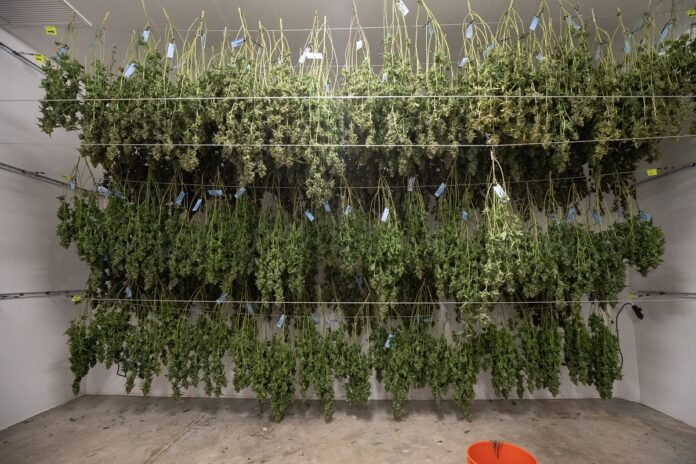Like every other consumed product, organic cannabis is riding a wave of interest from consumers seeking a clean and sustainable alternative to the mainstream. But is there enough interest to make cultivating organic cannabis worthwhile for growers and distributors?
For many cannabis producers, the choice to go organic stems from a selfish impulse: the personal desire to consume the cleanest possible version of the product. When looking into the possibility of growing organic crops, these same people discover organically grown plants often present superior taste and effect. That’s a feature with key marketability when businesses share information from a place of authenticity and personal experience, not in a “sales-y” way. Fundamentally, the best reason to go organic is to provide people with a superior product while at the same time advocating for their health and the health of the planet.
While producing organic goods usually comes at a higher cost for the producer—and presents no real benefit in the marketplace just yet—there is growing consumer demand for clean, sustainable products. In the short term, the only real benefit for cultivators is peace of mind knowing they are working harder to provide a better product with less impact to the planet. But that will change.
Consumers often see marijuana in general as a “natural” product regardless how plants were grown, but the distinction between organic and non-organic is expanding. Just as those same people might opt for the organic aisle in the produce department of a local grocery store, so will they look for organic certification in the cannabis they ingest.
The challenges to launching and managing an organic grow are like those in most other areas of the industry. Stringent packaging and testing requirements have high costs. As the scale and size of new gardens is increased, cannabis is becoming commoditized and it is harder to stand out as a small craft producer. To be truly organic and compete with huge industrial farms is easy from a quality standpoint but difficult because those places are driving down the price
Consider large national breweries versus local craft brewing companies: The difference between the two products is stark, and people who truly are interested in a quality product will gravitate to the smaller craft brand even with the higher price point. That is a select group of consumers, however, so expanding the organic brand distinction to a more general audience is vital.
The perception that all cannabis is organic is fed by dispensaries. Many use “Organic” this or “All Natural” that in their names or marketing when, in fact, they do not vet the gardens from which they purchase their products. They have no information about how the plants from which the oils in edibles and cartridges were grown. Unlike the grocery store analogy, there are no organic shelves in dispensaries. Thoughtful packaging that preserves the product, as well as a consistent message, are key to creating somewhat of a cult following. The important point for any new cannabis business thinking about going organic is to maintain a strong core customer base of those who value what is on offer: a cleaner, sustainable product that provides a better experience.
Some dispensaries do focus on organic products, but others make unsubstantiated claims about products with the highest margin or latest celebrity endorsement. Some focus on organically grown bud, but the edibles they offer are sourced from the least expensive producers, who most often use conventionally grown ingredients. The bottom line is the primary concern for some dispensaries, while others see the value in creating a solid brand and customer loyalty based on shared values. Consequently, purchasing organic products becomes much more difficult for consumers. They must figure out and understand the difference between marketing and reality. That requires research, and certainly certification of organic cannabis would go a long way to making consumers’ task easier.
The industry has been split in two, between purely profit-driven models and consumer-focused, quality medicine. For producers committed to creating a pure, organic product, consumer education is vital. For the same reasons people choose organic foods, they will choose organic marijuana.
The work of organizations like the Cannabis Certification Council (CCC) will be the big push that gets organic growers over the hump. Being able to use the term “organic” and have the label mean something specific in the cannabis space will be a huge step.
The CCC is a non-profit advocate for clean and sustainable business practices. The organization’s #WhatsInMyWeed campaign is a good example of how education about organic cannabis is valuable at both the consumer and industry levels. Being a non-profit means the CCC avoids conflict-of-interest issues in its current attempt to create an industry-wide certification standard for organic cannabis, which will allow producers to mark their products with a CCC “Organically Grown” label. Absent federal regulation, this is the best and clearest approach to ensuring industry members and consumers understand what they are getting when they purchase an organic product.
At the moment, non-inhaled product lines probably are the verticals with the least focus on “organic.” But there is growing demand in this area, because consumers want clean ingestibles as much as they want clean inhalables. Clear, universal certification will make branding and expanding this segment easier and more lucrative. It will take time, but edibles and extracts will catch up to inhaled product lines.

Anthony “Ant” Franciosi is an honest-to-goodness farmer whose fingers are as green as the organic cannabis he grows. He is the proud founder of Honest Marijuana, an all-natural, completely organic marijuana growery in Colorado.








